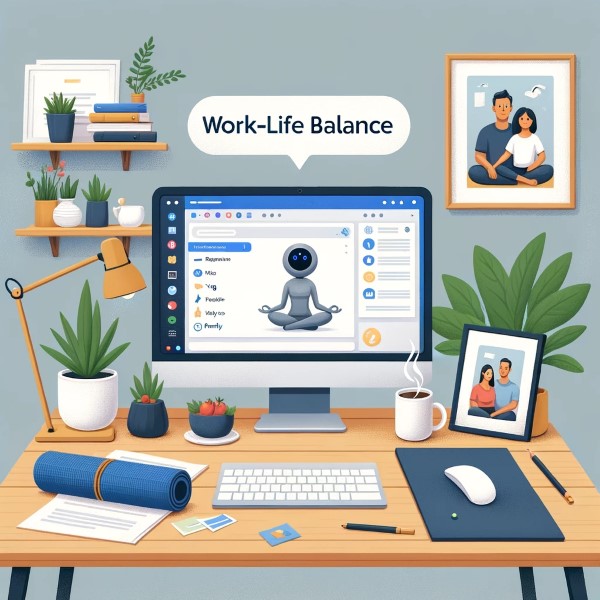Special Issue - Wired but Weary: Artificial Intelligence to Rescue Work-Life Balance in a Digitised Academia?
Newsletter
Digital technology has revolutionised academia, but at what cost to our work-life balance? As the boundaries blur, artificial intelligence emerges as a potential savior. Could virtual personal assistants be the key to reclaiming equilibrium in our professional and personal lives?
Bill Gates (1) claims we will soon all have a virtual personal assistant (VPA). An agent empowered by various artificial intelligence technologies that could take charge of simple daily tasks and support you with the more creative ones. Its potential impacts are vast: communication, information, planning, learning, health, etc. The promise is to earn flexibility while saving time and resources. You can imagine your VPA as the project manager of your life, ensuring you focus on what matters and achieve your goals. Sounds tempting in the demanding world of academia, right?
But what about work-life balance? How can it help?
Imagine your VPA organising a balanced schedule. For example, it would consider your private commitments and automatically arrange your professional appointments accordingly. It would prioritise your activities and prepare backup solutions for the ones you cannot attend. It could remind you of activities in a timely manner to ensure you meet all your deadlines. In our increasingly busy lives, this also promises to reduce the noise and only get curated information. It could send you relevant information for your projects, ensuring you don’t get non-urgent notifications outside working hours and making a curated summary of past activity when you return.
In summary, it could differentiate your life from the professional activity and improve your time management, prioritisation, and flexibility to support balance. Your VPA will work for you to make your life smoother.
Bionote:
Quentin Loisel is a current MSCA PhD fellow at Glasgow Caledonian University and the MCAA UK Chapter Chair. He is part of the Health CASCADE project, aiming to make co-creation trustworthy. The goal of the project is to develop technologies that will enable evidence-based co-creation. His work bridges technology and the fundamental human dimension within the values of the co-creation process. His work focuses on how artificial intelligence can improve collective intelligence. With the growing influence of technology in our society, Quentin aims to enable collaboration between society’s actors to make the best of future technology.

An increasingly blurred border
However, considering that it could be one day technically possible, these technologies bring new crucial challenges concerning work-life balance. Firstly, there is a cognitive cost since new technology requests continuous learning and adaptation. Secondly, it must access most of your personal and professional information to work optimally. This leads to significant ethical and privacy concerns. Thirdly, there is the risk of an over-reliance on technology. Indeed, you might not always be aware of or in control of all actions taken by your VPA. It will make mistakes, and you will be the first impacted. Moreover, if the system shuts down, it will be hard to get back on track. This leads to the fourth point: you may face significant damage in a cyberattack with such a global management system (e.g., a leak of personal and professional data). Finally, since the VPA might centralise the interaction, it might reduce interactions with others and increase isolation.
Beyond these challenges, there are two essential questions: what is a work-life balance, and how to operationalise it?
It is fundamental because we must train or feature the VPA to be “aware” of work-life balance and how to enable it. If not appropriately specified, the default paradigm might be the dominant one: more productivity. Indeed, digital technologies have been implemented with the same justifications until now: “Do more with less”, “You will save time”, or “It brings more flexibility”. However, we saw that this rationale could interfere with a balanced work-life and result in the need to control or change digital tools usage to restore equilibrium.

AI with everyone
This technology holds transformative potential for enhancing productivity and reshaping the work dynamics in academia. Nonetheless, it must also consider setting boundaries and self-care to achieve work-life balance. This technology won’t naturally consider it and even brings new challenges for the same. Learning from past technology implementations, it is worth working on this question before to avoid having to fix the
issues afterwards.
Defining work-life balance at an individual and institutional level is essential. These characteristics need to be stated as clearly as possible to be operationalised. A VPA might be able to identify how to operate independently, but the more specific the rules, the more efficient the actions will be. Thanks to great versatility, these technologies could optimally combine individual needs with the institutional culture to encourage a better work-life balance.
But remember, the impact can be immense, positive or negative. The one who will define the rules and implement the technology will have the power to enforce a vision. Ethical considerations are enormous: everyone who will be impacted should take part in the creation, implementation, and monitoring.
Conclusion
If technical and other crucial challenges are solved, the personal VPA might manage aspects of our private and professional lives, impacting both more than any technology ever did before. All stakeholders should participate in creating precise work-life balance characteristics and integrate them during the creation of the technology. A close human-AI collaboration should monitor implementation and usage. This technology could significantly improve work-life balance but it won’t happen without you!
Quentin Loisel
Chair of the United Kingdom Chapter
quentin.loisel@gcu.ac.uk
Twitter: @q5loisel
References
Gates, B. (2023, March 21). The Age of AI has begun. gatesnotes.com. https://www.gatesnotes.com/The-Age-of-AI-Has-Begun